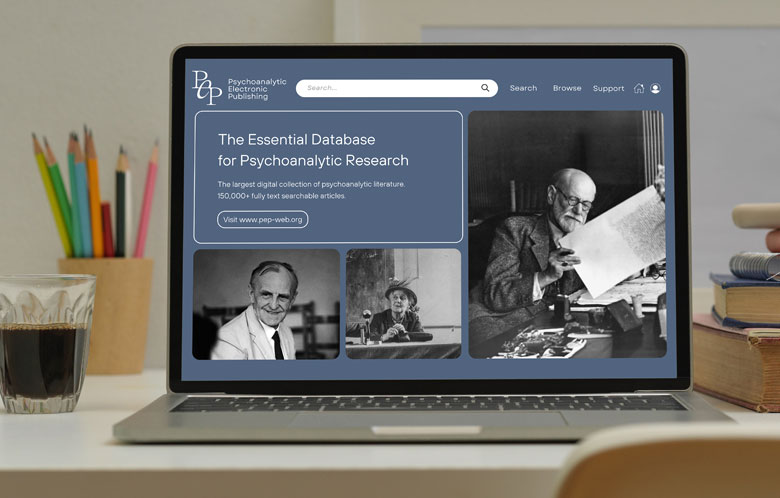Created in collaboration by the leading professional bodies in the US and UK (the American Psychoanalytic Association and the British Institute of Psychoanalysis), the PEP Archive includes a complete set of high-quality peer-reviewed, full-text journals for psychoanalytic research. In addition, the archive contains all 24 volumes of the Standard Edition of the Complete Psychological Works of Sigmund Freud in English and in the original German (cross-linked by paragraph), as well as 125 books by leading psychoanalysts. In total, the archive holds over 150,000 articles and 21,000 associated figures and illustrations, with all articles and references being fully interlinked.
To learn more about this indispensable database, read our interview with PEP Archive founders David Tuckett, Peter Fonagy, and Nadine Levinson. They answer questions about psychoanalysis, the field of psychology, and more.
PEP-Web announced new updates coming to the database this year. Can you tell us about this new content and how it will expand on the current collection?
This year as in every other year, PEP have added two types of new content to the database so that all subscribers have access to them at no additional cost.
One update releases a further year of journal material – for 2024, full-text content now includes 2020 volumes and earlier for the majority of active publications (2018 and earlier for those with 5-year copyright embargoes).
A second update adds entirely new material – this year, an additional 25 books. PEP recently secured re-licensing rights for titles in the New Library of Psychoanalysis, the full collection of which will appear on PEP in the next few years. This authoritative series contains works by many leading authors and aims to stimulate the interchange of ideas across different schools of psychoanalysis both internationally and between psychoanalysis and other disciplines. The 25 new titles include works by Otto Kernberg, André Green, and Thomas Ogden, amongst others.
What other disciplines, besides psychology and psychiatry, could find PEP Archive to be a useful database for their own research?
Psychoanalysis provides access to increasingly relevant alternate frameworks for understanding subjective human experience and decision-making. As such, in this age of uncertainty, psychoanalysis is increasingly recognized as capable of providing a modern and significant perspective for critical thinking in social science, philosophy, economics, political science, and literature, as well as the arts and humanities more generally.
In particular, as confirmed by the breakthrough advances in recent years in cognitive and affective neuroscience, psychoanalysis is increasingly turned to by researchers requiring an expanded framework for understanding how imagination and feeling “work” in the human brain - opening up avenues of thinking and research substantially different to those long-present in mainstream academia. The PEP Archive, for example, includes the complete set of the journal Neuropsychoanalysis.
The literature surrounding psychoanalytic research is an indispensable tool for those looking to extend their knowledge of psychoanalysis. With content dating back to 1909 and spanning over 115 publication years, users are sure to find notable content for all their research needs. In this way, PEP Archive is a valuable resource for students and researchers in psychology and psychiatry, as well as many other disciplines.
What are some common myths around psychoanalysis and how does PEP Archive help debunk some of these myths?
Common myths about psychoanalysis imply it is old-fashioned, fanciful, and unscientific, making it largely irrelevant to present day academia.
Those with access to the PEP Archive will be able to view the original publications of Freud and others and so access the strange language of late nineteenth century medical science and psychology. But they will also be able to see how things have moved on in such a way that, translated into modern thinking, these original ideas comprise complex and sophisticated ways of understanding the human condition and the troubles with which we all contend.
Access to the PEP Archive allows readers to see what Freud was really trying to address, notably the role of the body in the mind and the role of thinking in feeling. They will also be able to read contemporary clinical accounts and theoretical innovations demonstrating and deepening our understanding of the role of fantasy and feeling as core dimensions of human life.
Psychoanalysis has evolved a lot over the years. How has PEP Archive kept up with these changes to the field and the literature around it?
PEP Archive’s content is dynamic. As well as securing original material in the form of the older journals, we are continuously sourcing and adding new journals from around the world. Similarly, the book collection continues to expand, featuring both classic and contemporary works by popular psychoanalytic authors. PEP Archive is, therefore, the authoritative source for all work in this field.
Where do you see PEP Archive going in the future? Are there other topics, authors or ideas you want to explore more? Are there any areas within the field that are ripe for expansion?
Currently, the PEP Archive includes virtually all significant psychoanalytic writing in English as well as the most authoritative journal articles in German, French, and Spanish, in addition to Freud’s complete works in German and the Standard Edition in English. It also includes most of Freud’s correspondence with his main interlocutors.
Going forward, there is opportunity to seek out and include various significant orphan works relevant to psychoanalysis (often originally published in books or in journals aimed at other readerships) missing from the current collection. As an organization, PEP takes seriously its archival role of preserving key texts of psychoanalytic history for the community it serves. We continue to seek out and digitize important but now out of print works from the early formative years of psychoanalytic practice.
The archive’s ambition is not limited to preservation, but also to deepening conversations with neighboring disciplines and other psychotherapeutic schools and traditions. On the horizon, the focus will be adding further books and journals in French, German, and Portuguese, as well as works in the Lacanian and the psychodynamic traditions. We will also enrich the collection with special issues in journals from the medical field that have a direct bearing on psychoanalytic thinking.
Over the medium term, PEP will continue to develop its own content. One of the smaller projects in the works is producing high-level multimedia commentary on significant papers, drawing on experts from across the field. Additionally, as a non-profit organization with a Board and Advisory Board comprising eminent psychoanalytic scholars and researchers, PEP is in a position to commission and evolve work innovatively into the future.



